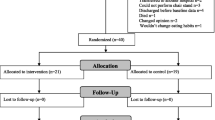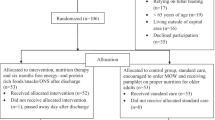Abstract
Objectives
To compare the effects of two nutritional follow-up interventions with regard to preventing short-term deterioration in ADL, and to compare their effects on physical function, emotional health, and health-related quality of life.
Design
Randomized clinical trial with two intervention groups and one control group, and a follow-up period of eight weeks.
Setting
Intervention in the participants’ homes after discharge from hospital.
Participants
Inclusion: Malnourished geriatric patients and patients at risk of malnutrition (MNA<24), aged 75 years and older, living at home and alone.
Exclusion
Nursing home residents and patients with terminal illnesses or cognitive impairment.
Randomization
At discharge, the patients were assigned to one of three groups: ‘home visit’, ‘telephone consultation’, or ‘control’ group.
Intervention
Individually tailored nutritional counselling of the patient and the patient’s daily home carer by a clinical dietician one, two, and four weeks after discharge from hospital. The counselling was either in-person at the patients’ homes, or by telephone. The control group received no follow-up after discharge.
Measurements
Primary outcome: Change in ADL (Barthel-100 score) at discharge and eight weeks later.
Secondary outcomes
Change in physical performance (handgrip strength, 30-sec. chair stand test, CAS), quality of life and depression measurements (SF-36, Depression List, Geriatric Depression Score), and Avlund mobility-tiredness score (Mob-T).
Results
Two-hundred and eight participants were randomized, 73 to home visits and 68 to telephone consultations. The control group comprised 67 patients. The mean age of the participants was 86.1 years. At eight weeks after discharge, 157 completed the follow-up (home visit 52, telephone consultation 51, and control group 54). The mean age of these patients was 85.8 years. More patients in the home visit group improved or maintained their ADL (96%), compared to the telephone (75%) and control groups (72%), p<0.01. No difference was detected among the groups with regard to physical measurements, health-related quality of life, and emotional health.
Conclusion
Early nutritional follow-up after discharge, performed as home visits, prevents deterioration of ADL in malnourished, independent, geriatric patients who live alone and thereby preserves their independence.





Similar content being viewed by others
References
Kaiser MJ, Bauer JM, Ramsch C, Uter W, Guigoz Y, Cederholm T, et al. Frequency of malnutrition in older adults: a multinational perspective using the mini nutritional assessment. J Am Geriatr Soc 2010 Sep;58(9):1734–1738.
Charlton KE, Nichols C, Bowden S, Lambert K, Barone L, Mason M, et al. Older rehabilitation patients are at high risk of malnutrition: evidence from a large Australian database. J Nutr Health Aging 2010 Oct;14(8):622–628.
Stanga Z, Allison S, Vandewoude M, Schneider SM. Nutrition in the elderly. In: Sobotka L, editor. Basics in Clinical Nutrition: Publishing House Galén, Prague; 2011. p. 540–563.
Wakabayashi H, Sashika H. Malnutrition is associated with poor rehabilitation outcome in elderly inpatients with hospital-associated deconditioning a prospective cohort study. J Rehabil Med 2014 Mar;46(3):277–282.
MacIntosh C, Morley JE, Chapman IM. The anorexia of aging. Nutrition 2000 Oct;16(10):983–995.
Neumann SA, Miller MD, Daniels L, Crotty M. Nutritional status and clinical outcomes of older patients in rehabilitation. J Hum Nutr Diet 2005 Apr;18(2):129–136.
Sorbye LW, Schroll M, Finne Soveri H, Jonsson PV, Topinkova E, Ljunggren G, et al. Unintended weight loss in the elderly living at home: the aged in Home Care Project (AdHOC). J Nutr Health Aging 2008 Jan;12(1):10–16.
Dale B, Soderhamn U, Soderhamn O. Self-care ability among home-dwelling older people in rural areas in southern Norway. Scand J Caring Sci 2012 Mar;26(1):113–122.
Iizaka S, Tadaka E, Sanada H. Comprehensive assessment of nutritional status and associated factors in the healthy, community-dwelling elderly. Geriatr Gerontol Int 2008 Mar;8(1):24–31.
Gariballa S, Forster S. Dietary supplementation and quality of life of older patients: a randomized, double-blind, placebo-controlled trial. J Am Geriatr Soc 2007 Dec;55(12):2030–2034.
Pirlich M, Schutz T, Kemps M, Luhman N, Minko N, Lubke HJ, et al. Social risk factors for hospital malnutrition. Nutrition 2005 Mar;21(3):295–300.
Callen BL, Wells TJ. Views of community-dwelling, old-old people on barriers and aids to nutritional health. J Nurs Scholarsh 2003;35(3):257–262.
Westergren A, Hagell P, Sjodahl Hammarlund C. Malnutrition and risk of falling among elderly without home-help service—a cross sectional study. J Nutr Health Aging 2014 Dec;18(10):905–911.
Tsubota-Utsugi M, Kikuya M, Satoh M, Inoue R, Hosaka M, Metoki H, et al. Living situations associated with poor dietary intake among healthy Japanese elderly: the Ohasama Study. J Nutr Health Aging 2015 Apr;19(4):375–382.
Fortinsky RH, Covinsky KE, Palmer RM, Landefeld CS. Effects of functional status changes before and during hospitalization on nursing home admission of older adults. J Gerontol A Biol Sci Med Sci 1999 Oct;54(10):M521–6.
Price R, Daly F, Pennington CR, McMurdo MET. Nutritional Supplementation of Very Old People at Hospital Discharge Increases Muscle Strength: A Randomised Controlled Trial. Gerontology 2005 May/Jun;51(3):179.
Potter JM, Roberts MA, McColl JH, Reilly JJ. Protein energy supplements in unwell elderly patients—a randomized controlled trial. JPEN J Parenter Enteral Nutr 2001 Nov-Dec;25(6):323–329.
Cawood AL, Elia M, Stratton RJ. Systematic review and meta-analysis of the effects of high protein oral nutritional supplements. Ageing Res Rev 2012 Apr;11(2):278–296.
Hubbard GP, Elia M, Holdoway A, Stratton RJ. A systematic review of compliance to oral nutritional supplements. Clin Nutr 2012 Jun;31(3):293–312.
Milne AC, Potter J, Vivanti A, Avenell A. Protein and energy supplementation in elderly people at risk from malnutrition. Cochrane Database Syst Rev 2009 Apr 15;(2)(2):CD003288.
Persson M, Hytter-Landahl A, Brismar K, Cederholm T. Nutritional supplementation and dietary advice in geriatric patients at risk of malnutrition. Clin Nutr 2007 04;26(2):216–224.
Beck AM, Kjaer S, Hansen BS, Storm RL, Thal-Jantzen K, Bitz C. Follow-up home visits with registered dietitians have a positive effect on the functional and nutritional status of geriatric medical patients after discharge: a randomized controlled trial. Clin Rehabil 2013 Jun;27(6):483–493.
Breedveld-Peters JJ, Reijven PL, Wyers CE, van Helden S, Arts JJ, Meesters B, et al. Integrated nutritional intervention in the elderly after hip fracture. A process evaluation. Clin Nutr 2012 Apr;31(2):199–205.
Lee LC, Tsai AC, Wang JY. Need-based nutritional intervention is effective in improving handgrip strength and Barthel Index scores of older people living in a nursing home: A randomized controlled trial. Int J Nurs Stud 2015 Jan 20.
Beck AM, Holst M, Rasmussen HH. Oral nutritional support of older (65 years+) medical and surgical patients after discharge from hospital: systematic review and meta-analysis of randomized controlled trials. Clin Rehabil 2013 Jan;27(1):19–27.
Avenell A, Handoll HH. Nutritional supplementation for hip fracture aftercare in older people. Cochrane Database Syst Rev 2010 Jan 20;(1):CD001880. doi(1):CD001880.
Baldwin C, Weekes CE. Dietary advice with or without oral nutritional supplements for disease-related malnutrition in adults. Cochrane Database Syst Rev 2011 Sep 7;(9):CD002008. doi(9):CD002008.
Nieuwenhuizen WF, Weenen H, Rigby P, Hetherington MM. Older adults and patients in need of nutritional support: Review of current treatment options and factors influencing nutritional intake. Clin Nutr 2010 /;29(2):160–169.
Spahn JM, Reeves RS, Keim KS, Laquatra I, Kellogg M, Jortberg B, et al. State of the evidence regarding behavior change theories and strategies in nutrition counseling to facilitate health and food behavior change. J Am Diet Assoc 2010 Jun;110(6):879–891.
Marshall S, Bauer J, Isenring E. The consequences of malnutrition following discharge from rehabilitation to the community: a systematic review of current evidence in older adults. J Hum Nutr Diet 2014 Apr;27(2):133–141.
Pedersen J, Pedersen P, Damsgaard E. Nutritional follow-up after discharge of malnourished geriatric patients- design of a randomized clinical study. Journal of Aging Research & Clinical Practice 2015;4(2):92–101.
Shah S, Vanclay F, Cooper B. Improving the sensitivity of the Barthel Index for stroke rehabilitation. J Clin Epidemiol 1989;42(8):703–709.
Jones CJ, Rikli RE, Beam WC. A 30-s chair-stand test as a measure of lower body strength in community-residing older adults. Res Q Exerc Sport 1999 Jun;70(2):113–119.
Foss NB, Kristensen MT, Kehlet H. Prediction of postoperative morbidity, mortality and rehabilitation in hip fracture patients: the cumulated ambulation score. Clin Rehabil 2006 Aug;20(8):701–708.
Ware JE, Jr, Sherbourne CD. The MOS 36-item short-form health survey (SF-36). I. Conceptual framework and item selection. Med Care 1992 Jun;30(6):473–483.
Gerritsen DL, Steverink N, Ooms ME, Ribbe MW. Finding a useful conceptual basis for enhancing the quality of life of nursing home residents. Qual Life Res 2004 Apr;13(3):611–624.
Gerritsen DL, Steverink N, Ooms ME, de Vet HC, Ribbe MW. Measurement of overall quality of life in nursing homes through self-report: the role of cognitive impairment. Qual Life Res 2007 Aug;16(6):1029–1037.
Sheikh JI YJ. Geriatric Depression Scale: recent evidence and development of a shorter version. In: Brink TL, editor. Clinical gerontology: a guide to assessment and intervention New York: Hawtorn Press; 1986. p. 165–173.
Avlund K, Kreiner S, Schultz-Larsen K. Functional ability scale for the elderly- a validation study. European Journal of Public Health 1996;6(1):35–42.
Guigoz Y, Lauque S, Vellas BJ. Identifying the elderly at risk for malnutrition: The Mini Nutritional Assessment. Clin Geriatr Med 2002 11;18(4):737–757.
Vellas B, Guigoz Y, Garry PJ, Nourhashemi F, Bennahum D, Lauque S, et al. The Mini Nutritional Assessment (MNA) and its use in grading the nutritional state of elderly patients. Nutrition 1999 Feb;15(2):116–122.
Covinsky KE, Pierluissi E, Johnston CB. Hospitalization-associated disability: «She was probably able to ambulate, but I’m not sure». JAMA 2011 Oct 26;306(16):1782–1793.
Boyd CM, Landefeld CS, Counsell SR, Palmer RM, Fortinsky RH, Kresevic D, et al. Recovery of activities of daily living in older adults after hospitalization for acute medical illness. J Am Geriatr Soc 2008 Dec;56(12):2171–2179.
Mistiaen P, Poot E. Telephone follow-up, initiated by a hospital-based health professional, for postdischarge problems in patients discharged from hospital to home. Cochrane Database Syst Rev 2006 Oct 18;(4)(4):CD004510.
Pedersen PU. Nutritional care: the effectiveness of actively involving older patients. J Clin Nurs 2005 02;14(2):247–255.
Terwee CB, Bot SDM, de Boer MR, van der Windt DAWM, Knol DL, Dekker J, et al. Quality criteria were proposed for measurement properties of health status questionnaires. J Clin Epidemiol 2007 1;60(1):34–42.
Bodilsen AC, Juul-Larsen HG, Petersen J, Beyer N, Andersen O, Bandholm T. Feasibility and inter-rater reliability of physical performance measures in acutely admitted older medical patients. PLoS One 2015 Feb 23;10(2):e0118248.
McMurdo MET, Price RJG, Shields M, Potter J, Stott DJ. Should Oral Nutritional Supplementation Be Given to Undernourished Older People upon Hospital Discharge? A Controlled Trial. J Am Geriatr Soc 2009;57(12):2239–2245.
Neelemaat F, Bosmans JE, Thijs A, Seidell JC, van Bokhorst-de van der Schueren, M.A. Post-discharge nutritional support in malnourished elderly individuals improves functional limitations. J Am Med Dir Assoc 2011 May;12(4):295–301.
Author information
Authors and Affiliations
Corresponding author
Rights and permissions
About this article
Cite this article
Pedersen, J.L., Pedersen, P.U. & Damsgaard, E.M. Early nutritional follow-up after discharge prevents deterioration of ADL functions in malnourished, independent, geriatric patients who live alone–A randomized clinical trial. J Nutr Health Aging 20, 845–853 (2016). https://doi.org/10.1007/s12603-015-0629-2
Received:
Accepted:
Published:
Issue Date:
DOI: https://doi.org/10.1007/s12603-015-0629-2




